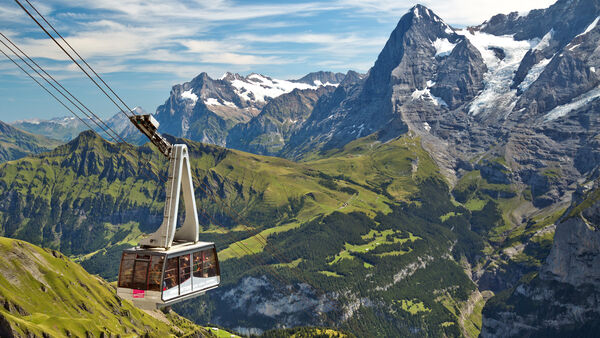The Schilthornbahn: Bringing Life to the Village and the Village to the Alps
By Rick Steves
Suddenly, a bright modern cable car swooshes by with 30 tourists gawking out the windows. I’m watching the Schilthornbahn mountain lift from the terrace of a hotel in the tiny traffic-free hamlet of Gimmelwald, high in the Swiss Alps just south of Interlaken.
My friend Walter, who runs the hotel, joins me with a drink and tells me a local tale illustrating how the Schilthornbahn is good for more than tourism. In Gimmelwald, the modern world began in 1965 with the arrival of the cable car. Before that, mothers ready to give birth had to hike an hour downhill to the valley floor for a ride into Interlaken. Many mothers didn’t make it all the way to the hospital. Just outside of Interlaken, a curve in the road is named for Zita, a Gimmelwald baby born right…there.
Today, the all-powerful Schilthornbahn connects Stechelberg on the valley floor with the mountain communities of Gimmelwald and Mürren on its way to the 10,000-foot Schilthorn summit. This lift shuttles life’s essentials—mail, bread, and coffins—plus skiers, hikers, schoolkids, and hang gliders, along with all those tourists—to and from each community.
The next morning, I decide to start my day by riding the cable car up to the summit of the Schilthorn, which is capped by a restaurant called Piz Gloria. Lifts go twice hourly, involve two transfers, and take 30 minutes. Inside the gondola, watching the altitude meter go up, up, up comes with a soundtrack: my ears popping.
Reaching the top, I head to an unforgettable breakfast. Every table in the revolving restaurant comes with a thrilling and eventually 360-degree view. The experience never gets old. I sip my coffee slowly to enjoy one complete circle. Then, I drop into the theater to see clips from the James Bond movie On Her Majesty’s Secret Service, in which it seems that this same restaurant is blown up. Finally, I go outside for the real thrills—to frolic on the ridge. A combination of the thin air and watching hang gliders jump into airborne ecstasy always stokes my pumping heart.
Now it’s time to head back down the mountain. While it’s possible to hike down from the top, I’ve found that the first cable-car station below the summit, Birg, is the best jumping-off point for a high-country hike. Leaving Birg, I hike down toward Gimmelwald. Within a couple minutes, I’m surrounded by a harsh alpine world. After skidding through a patch of loose shale, I stop for a moment—just to hear the tumbling pebbles eventually grow silent and be replaced by the distant tinkling of cowbells and a cascading stream. As I hike gingerly along the edge of a ridge, dramatic valleys stretch to my left and right while, high above, icy Alps pop against a brilliant blue.
If the quality of a church is a matter of how close you feel to God, being high in the Alps just might be Europe’s ultimate cathedral. A day like today, with a perch like this, has holy rollers doing cartwheels and even Lutherans raising their hands.
After a steep descent, I step out of the forest and reach the village I call home this week. The finish line is a bench that sits where the trail hits the tiny paved lane that marks the high end of Gimmelwald. This bench is one of my favorite “savor Europe” spots: the right place to just sit still and take it all in. Cows munch, ignoring the view. The little resort of Mürren crowns a bluff above me on the left, keeping all the fancy tourists where they belong. Directly across the valley, a river bursts out of a glacier. Below that, in a lonely meadow, an alpine farm that has intrigued me for years still sits high above the tree line, forever alone amid distant flecks that must be cows and goats. Below me, the village schoolyard comes with the happy noise of children at play. Suddenly, Christian, a farmer (and the town’s go-to accordion player), rumbles by. He’s coming back from the fields in his mini truck towing a wobbly wagonload of hay. His kids bounce on top like happy cartoons.
There are many peaks and ridges in Switzerland offering high-elevation thrills—but at the end of the day, I love kicking off my boots in storybook-perfect Gimmelwald. Celebrating the moment, I realize that I wouldn’t be there—and neither would it—if not for the mighty Schilthornbahn.
This article was adapted from Rick’s new book, For the Love of Europe.

